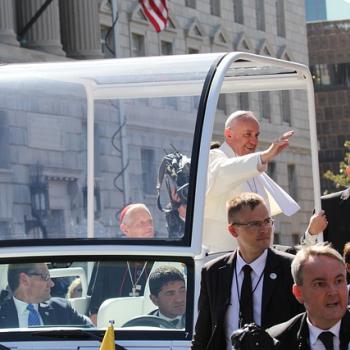I often remark to my friends that my favorite resurrection story is the one in Mark, partly because it the best storytelling of the four. It refuses to tie up loose ends and leaves the idea of resurrection ephemeral, filled with conflicting, tragic emotions. And to me it goads readers to look for the resurrection, not on the page, but in the world around, for evidence that indeed Jesus lives and that the Reign of God is here. In effect, in Mark, the resurrection is dethroned from its place of centrality within Christian faith. In Mark, Jesus' life, not his death and resurrection, is the source of inspiration. While the way Jesus lived certainly led to his death and resurrection, it is not necessarily the primary point.
Yet, Easter remains critical to Christians, historically and theologically. In their book, The Last Week, scholars Marcus Borg and John Dominic Crossan suggest that without Easter—the resurrection of Jesus—there would be no Christianity. Without Easter, Jesus would not have been known as the Christ and he would not have been worth remembering. Instead, he would have been just another prophet, one more zealous subversive that died unceremoniously at the hands of Rome.
And, to me, this is the great tragedy of Easter: that the three years of Jesus' public life, his profound teachings and subversive social work would not have been enough on their own—and still are not enough—to keep his followers faithful. In this formula of faith, it can be difficult to remember that Jesus didn't live in order to die on Good Friday and be resurrected on Easter Sunday. Rather Jesus died and was resurrected because of the way he lived on every other nameless day of his life. Somehow, in the course of 2,000 years, many Christians have gotten this backward, focusing on the final three days of Jesus' life at the expense of the three years of Jesus' public work.
A few years ago, while I was tidying up the house, I heard the conspicuous rip of pages, a then-favorite activity of my 2-year-old. I went to the living room to survey the damage and found that my son had gotten his hands on my Bible, opened it and discovered the truly satisfying sound of a torn page, particularly one so wafer thin.
I looked down at the few pages scattered on the floor to see what my toddler's heresy had destroyed. It was the resurrection. And it made me wonder whether, if there were no resurrection, would the gospels then be enough for me? Is the way Jesus lived powerful enough to command my allegiance? Do I follow Jesus because something miraculous happened, or do I follow Jesus because I believe the way Jesus showed us is the Way?
In other words, I wonder whether our human need for Easter—for a sign or wonder to legitimate the Good News—is what makes the resurrection essential to the Christian faith. And, I question whether the resurrection should be such a theological lynchpin that the slightest doubt or disbelief topples the whole thing and makes Christian objects of pity, as Paul remarks. Doubt and disbelief are important to the Easter experience in the Gospels, and Jesus does not condemn his disciples for them. So, if we want to experience the resurrection, I suggest that we not simply celebrate it or find joy and hope in it. We must doubt it, too. We must admit our disbelief.
In truth, Easter absorbs both the joy and triumph as well as the fear and disbelief, and is irreducible to just one experience of it. It would be easier if Easter were only the trumpet blasts and Alleluias. Or, it might even be easier if Easter were only fear and disbelief. But Easter is all of this, it holds all of it, even the contradictory emotions, and makes them one. And that is what makes the Paschal event such a profound mystery.
O God, we confess that we need Easter to believe in your Christ, and we repent that his life is too often not enough to sustain our faith. And we confess our conflicting emotions, the doubt coupled with triumph, the fear coupled with joy that we carry with us this Easter day. Give us the strength not to reduce our experience of Easter to a single emotion, but rather open our hearts to the complexity of our response to these mysteries of faith. When we doubt the resurrection, renew our belief. When we believe the resurrection, renew our doubt. And always, unite us in that renewal.
As a child, my family had an odd way of expressing our love for one another.
We would scare each other to the point of tears, screams, and then laughter. My mother would hide on top of the washing machine if she knew we were coming in from the garage, hop down and roar at us. My dad would pop out from behind couches and make us jump out of our skin. And when we were old enough, my brother and I loved returning the favor.




